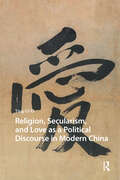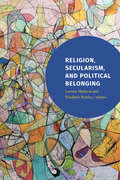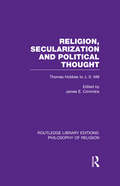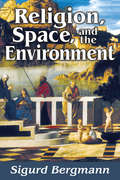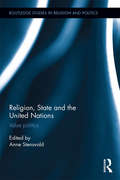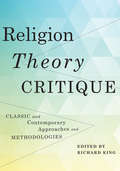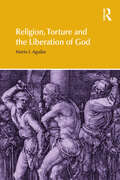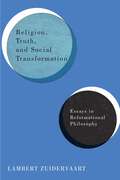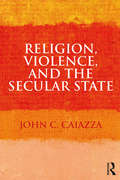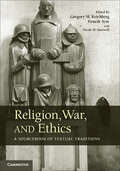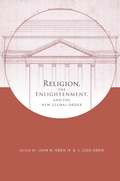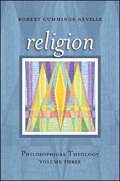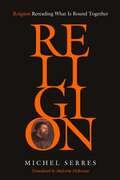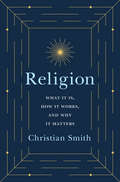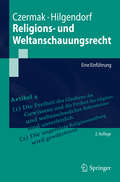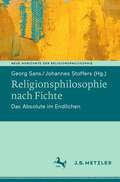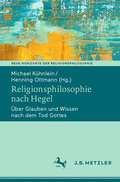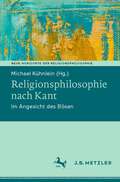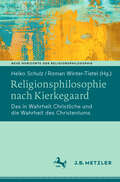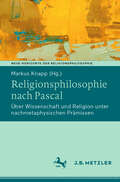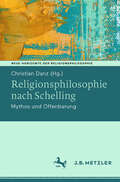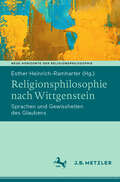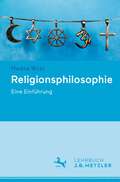- Table View
- List View
Religion, Redemption and Revolution
by Wayne CristaudoReligion, Redemption, and Revolution closely examines the intertwined intellectual development of one of the most important Jewish thinkers of the twentieth century, Franz Rosenzweig, and his friend and teacher, Christian sociologist Eugen Rosenstock-Huessy. The first major English work on Rosenstock-Huessy, it also provides a significant reinterpretation of Rosenzweig's writings based on the thinkers' shared insights -- including their critique of modern Western philosophy, and their novel conception of speech.This groundbreaking bookprovides a detailed examination of their 'new speech thinking' paradigm, a model grounded in the faith traditions of Judaism and Christianity. Wayne Cristaudo contrasts this paradigm against the radical liberalism that has dominated social theory for the last fifty years. Religion, Redemption, and Revolution provides powerful arguments for the continued relevance of Rosenzweig and Rosenstock-Huessy's work in navigating the religious, social, and political conflicts we now face.
Religion, Secularism, and Love as a Political Discourse in Modern China (China: From Revolution to Reform)
by Ting GuoWhat is the meaning of love in modern Chinese politics? Why has ai . (love) been a crucial political discourse for secular nationalism for generations of political leaders as a powerful instrument to the present day? This book offers the first systematic examination of the ways in which the notion of love has been introduced, adapted, and engineered as a political discourse for the building and rebuilding of a secular modern nation, all the while appropriating Confucianism, Christianity, popular religion, ghost stories, political religion, and their religious affects. The insights of this exploration expand not only the discussion of the role of emotions in the project of Chinese modernity, but also the study of affective governance and religious nationalisms around the world today.
Religion, Secularism, and Political Belonging
by Leerom Medovoi and Elizabeth BentleyWorking in four scholarly teams focused on different global regions—North America, the European Union, the Middle East, and China—the contributors to Religion, Secularism, and Political Belonging examine how new political worlds intersect with locally specific articulations of religion and secularism. The chapters address many topics, including the changing relationship between Islam and politics in Tunisia after the 2010 revolution, the influence of religion on the sharp turn to the political right in Western Europe, understandings of Confucianism as a form of secularism, and the alliance between evangelical Christians and neoliberal business elites in the United States since the 1970s. This volume also provides a methodological template for how humanities scholars around the world can collaboratively engage with sweeping issues of global significance.Contributors. Markus Balkenhol, Elizabeth Bentley, Kambiz GhaneaBassiri, David N. Gibbs, Ori Goldberg, Marcia Klotz, Zeynep Kurtulus Korkman, Leerom Medovoi, Eva Midden, Mohanad Mustafa, Mu-chou Poo, Shaul Setter, John Vignaux Smith, Pooyan Tamimi Arab, Ernst van den Hemel, Albert Welter, Francis Ching-Wah Yip, Raef Zreik
Religion, Secularization and Political Thought: Thomas Hobbes to J. S. Mill (Routledge Library Editions: Philosophy of Religion)
by James E. CrimminsThe increasing secularization of political thought between the mid-seventeenth and mid-nineteenth centuries has often been noted, but rarely described in detail. The contributors to this volume consider the significance of the relationship between religious beliefs, dogma and secular ideas in British political philosophy from Thomas Hobbes to J.S. Mill. During this period, Britain experienced the advance of natural science, the spread of education and other social improvements, and reforms in the political realm. These changes forced religion to account for itself and to justify its existence, both as a social institution and as a collection of fundamental articles of belief about the world and its operations. This book, originally published in 1990, conveys the crucial importance of the association between religion, secularization and political thought.
Religion, Space, and the Environment
by Sigurd BergmannReligions often nurture important skills that help believers locate themselves in the world. Religious perceptions, practices, emotions, and beliefs are closely interwoven with the environments from which they emerge. Sigurd Bergmann's driving emphasis here is to explore religion not in relation to, but as a part of the spatiality and movement within the environment from which it arises and is nurtured.Religion, Space, and the Environment emerges from the author's experiences in different places and continents over the past decade. At the book's heart lie the questions of how space, place, and religion amalgamate and how lived space and lived religion influence each other.Bergmann explores how religion and the memory of our past impact our lives in urban spaces; how the sacred geographies in Mayan and northeast Asian lands compare to modern eco-spirituality; and how human images and practices of moving in, with, and through the land are interwoven with the processes of colonization and sacralising, and the practices of power and visions of the sacred, among other topics.
Religion, State and the United Nations: Value Politics (Routledge Studies in Religion and Politics)
by Anne StensvoldThis volume approaches the UN as a laboratory of religio-political value politics. Over the last two decades religion has acquired increasing influence in international politics, and religious violence and terrorism has attracted much scholarly attention. But there is another parallel development which has gone largely unnoticed, namely the increasing political impact of peaceful religious actors. With several religious actors in one place and interacting under the same conditions, the UN is as a multi-religious society writ small. The contributors to this book analyse the most influential religious actors at the UN (including The Roman Catholic Church; The Organisation of Islamic Countries; the Russian Orthodox Church). Mapping the peaceful political engagements of religious actors; who they are and how they collaborate with each other - whether on an ad hoc basis or by forming more permanent networks - throwing light at the modus operandi of religious actors at the UN; their strategies and motivations. The chapters are closely interrelated through the shared focus on the UN and common theoretical perspectives, and pursue two intertwined aspects of religious value politics, namely the whys and hows of cross-religious cooperation on the one hand, and the interaction between religious actors and states on the other. Drawing together a broad range of experts on religious actors, this work will be of great interest to students and scholars of Religion and Politics, International Relations and the UN.
Religion, Theory, Critique: Classic and Contemporary Approaches and Methodologies
by Richard KingReligion, Theory, Critique is an essential tool for learning about theory and method in the study of religion. Leading experts engage with contemporary and classical theories as well as non-Western cultural contexts. Unlike other collections, this anthology emphasizes the dynamic relationship between "religion" as an object of study and different methodological approaches and openly addresses the question of the manifold ways in which "religion," "secular," and "culture" are imagined within different disciplinary horizons. This volume is the first textbook which seeks to engage discussion of classical approaches with contemporary cultural and critical theories.Contributors write on the influence of the natural sciences in the study of religion; the role of European Christianity in modeling theories of religion; religious experience and the interface with cognitive science; the structure and function of religious language; the social-scientific study of religion; ritual in religion; the phenomenology of religion; critical theory and religion; embodiment and religion; the impact of colonialism and modernity; theorizing religion in terms of race and ethnicity; links among religion, nationalism, and globalization; the interplay of gender, sex, and religion; and religion and the environment. Each chapter introduces the topic, identifies key theorists and issues, and respects the pluralistic nature of the scholarship in the field. Altogether, this collection scrutinizes the explicit and implicit assumptions theorists make about religion as an object of analysis.
Religion, Torture and the Liberation of God (Religion and Violence)
by Mario I AguilarIf God can be used by the powerful to justify violence in the name of order, he can also be used by the weak to illuminate the position of the victims of political conflict. Religion, Torture and the Liberation of God explores the theological possibilities of a God who is a prisoner and a victim of torture. The book relocates God to the horrors of the military abuse of human rights in Chile and the systematic rape of women in the Democratic Republic of Congo. Aguilar argues that this theological exercise offers us new ways of understanding the abuse of power, whether it be the clerical abuse of children, violence against women, or homophobia. This examination of torture and rape becomes, through a theology of praxis and compliance, an examination of solidarity, love and affection. The book concludes with an exploration of the possibilities of a tortured God who liberates.
Religion, Truth, and Social Transformation: Essays in Reformational Philosophy
by Lambert ZuidervaartReformational philosophy rests on the ideas of nineteenth-century educator, church leader, and politician Abraham Kuyper, and it emerged in the early twentieth century among Reformed Protestant thinkers in the Netherlands. Combining comprehensive criticisms of Western philosophy with robust proposals for a just society, it calls on members of religious communities to transform harmful cultural practices, social institutions, and societal structures.<P><P> Well known for his work in aesthetics and critical theory, Lambert Zuidervaart is a leading figure in contemporary reformational philosophy. In Religion, Truth, and Social Transformation – the first of two volumes of original essays from the past thirty years – he forges new interpretations of art, politics, rationality, religion, science, and truth. In dialogue with modern and contemporary philosophers, among them Immanuel Kant, G.F.H Hegel, Martin Heidegger, Theodor Adorno, Jürgen Habermas, and reformational thinkers such as Herman Dooyeweerd, Dirk Vollenhoven, and Hendrik Hart, Zuidervaart explains and expands on reformational philosophy’s central themes. This interdisciplinary collection offers a normative critique of societal evil, a holistic and pluralist conception of truth, and a call for both religion and science to serve the common good. <P> Illustrating the connections between philosophy, religion, and culture, and daring to think outside the box, Religion, Truth, and Social Transformation gives a voice to hope in a climate of despair.
Religion, Truth, and Social Transformation: Essays in Reformational Philosophy
by Lambert ZuidervaartA lucid introduction to a living philosophical tradition and a creative contribution to change-oriented scholarship.
Religion, Violence, and the Secular State
by John C. CaiazzaReligion, Violence, and the Secular State assesses contemporary religious violence in the context of tensions between state secularism and religious ethics, and ultimately concludes that the West must reemphasize its own religious tradition in order to successfully combat the rise of a violent fundamentalism. The book presents an argument in three parts: first, an examination of the nature of religious violence; second, the effects of the present secularism of the American state on our ineffective ethical framework; and third, an advocacy for both the reasonableness of religious belief and the value of religiously based ethics (i.e., Jewish, Christian, and Muslim) as an influence within the modern state. The conclusion is that, with the arrival of violent Islam in the West, the presence of (traditional) religious influence in the United States needs to be reemphasized to combat religious terrorism. Islam represents a challenge to America and the West as a religious ideal that can only be successfully met by an energetic renewal of our own religious resources.
Religion, War, and Ethics
by Gregory M. Reichberg Henrik Syse Nicole M. Hartwell Gregory M. Reichberg Henrik SyseReligion, War, and Ethics is a collection of primary sources from the world's major religions on the ethics of war. Each chapter brings together annotated texts - scriptural, theological, ethical, and legal - from a variety of historical periods that reflect each tradition's response to perennial questions about the nature of war: when, if ever, is recourse to arms morally justifiable? What moral constraints should apply to military conduct? Can a lasting earthly peace be achieved? Are there sacred reasons for waging war, and special rewards for those who do the fighting? The religions covered include Sunni and Shiite Islam; Judaism; Roman Catholic, Eastern Orthodox, and Protestant Christianity; Theravada Buddhism; East Asian religious traditions (Confucianism, Shinto, Japanese and Korean Buddhism); Hinduism; and Sikhism. Each section is compiled by a specialist, recognized within his or her respective religious tradition, who has also written a commentary on the historical and textual context of the passages selected.
Religion, the Enlightenment, and the New Global Order (Columbia Series on Religion and Politics)
by J. Owen John Owen IvLargely due to the cultural and political shift of the Enlightenment, Western societies in the eighteenth century emerged from sectarian conflict and embraced a more religiously moderate path. In nine original essays, leading scholars ask whether exporting the Enlightenment solution is possible-or even desirable-today. Contributors begin by revisiting the Enlightenment's restructuring of the West, examining its ongoing encounters with Protestant and Catholic Christianity, Judaism, Islam, and Hinduism. While acknowledging the necessity of the Enlightenment emphasis on toleration and peaceful religious coexistence, these scholars nevertheless have grave misgivings about the Enlightenment's spiritually thin secularism. The authors ultimately upend both the claim that the West's experience offers a ready-made template for the world to follow and the belief that the West's achievements are to be ignored, despised, or discarded.
Religion: Philosophical Theology, Volume Three
by Robert Cummings NevilleReligion is the third and final volume in Robert Cummings Neville's systematic development of a new philosophical theology. Unfolding through his earlier volumes, Ultimates and Existence, and now in Religion, philosophical theology considers first-order questions generally treated by religious traditions through philosophical methods while reflecting Neville's long engagement with philosophy, theology, and Eastern and Western religious traditions. In this capstone to the trilogy, Neville provides a theory of religion and presents a sacred worldview to guide religious participation. His philosophical theory of value enlightens religions' approaches to ethics, spirituality, and religious institutional living and collaboration. With a detailed examination of plausibility conditions for sacred worldviews, the book concludes with an exploration of "religionless religion" for which institutions of religion are of penultimate value.Through the development of philosophical theology, Neville has built a unique, multidisciplinary, comparative, nonconfessional theological system, one that addresses concerns and provides tools for scientific and humanistic scholars of religion, postmodern thinkers, intellectuals from both secular and religious backgrounds, and those interested in the global state of religion today.
Religion: Rereading What Is Bound Together
by Michel SerresWith this profound final work, completed in the days leading up to his death, Michel Serres presents a vivid picture of his thinking about religion—a constant preoccupation since childhood—thereby completing Le Grand Récit, the comprehensive explanation of the world and of humanity to which he devoted the last twenty years of his life. Themes from Serres's earlier writings—energy and information, the role of the media in modern society, the anthropological function of sacrifice, the role of scientific knowledge, the problem of evil—are reinterpreted here in the light of the Old Testament accounts of Isaac and Jonah and a variety of Gospel episodes, including the Three Wise Men of the Epiphany, the Transfiguration, Peter's denying Christ, the Crucifixion, Emmaus, and the Pentecost. Monotheistic religion, Serres argues, resembles mathematical abstraction in its dazzling power to bring together the real and the virtual, the natural and the transcendent; but only in its Christian embodiment is it capable of binding together human beings in such a way that partisan attachments are dissolved and a new era of history, free for once of the lethal repetition of collective violence, can be entered into.
Religion: What It Is, How It Works, and Why It Matters
by Christian SmithA groundbreaking new theory of religionReligion remains an important influence in the world today, yet the social sciences are still not adequately equipped to understand and explain it. This book builds on recent developments in science, theory, and philosophy to advance an innovative theory of religion that goes beyond the problematic theoretical paradigms of the past.Drawing on the philosophy of critical realism and personalist social theory, Christian Smith answers key questions about the nature, powers, workings, appeal, and future of religion. He defines religion in a way that resolves myriad problems and ambiguities in past accounts, explains the kinds of causal influences religion exerts in the world, and examines the key cognitive process that makes religion possible. Smith explores why humans are religious in the first place—uniquely so as a species—and offers an account of secularization and religious innovation and persistence that breaks the logjam in which so many religion scholars have been stuck for so long.Certain to stimulate debate and inspire promising new avenues of scholarship, Religion features a wealth of illustrations and examples that help to make its concepts accessible to readers. This superbly written book brings sound theoretical thinking to a perennially thorny subject, and a new vitality and focus to its study.
Religions- und Weltanschauungsrecht: Eine Einführung (Springer-Lehrbuch)
by Gerhard Czermak Eric HilgendorfDas Religions(verfassungs)recht hat angesichts der veränderten religionspolitischen Lage Konjunktur. Das Buch gibt eine kompakte Einführung in die theoretisch und praktisch wichtigsten Bereiche des Religionsrechts und greift vernachlässigte Fragen (etwa im Schulwesen oder bei der Kirchensteuer) auf. Es will überzeugen durch klare rechtliche Grundbegriffe und eine Abkehr von einer einseitig kirchenzentrierten Sichtweise. Normtexte und Rechtsprechungsübersichten runden das leserfreundliche, auch für Nichtjuristen interessante Buch ab.
Religionsphilosophie nach Fichte: Das Absolute im Endlichen (Neue Horizonte der Religionsphilosophie)
by Georg Sans Johannes StoffersJohann Gottlieb Fichte (1762–1814) befasste sich zeitlebens mit Fragen der Religion. Der frühe Fichte sah einen engen Zusammenhang zwischen göttlicher Weltregierung und sittlicher Ordnung – so zeigt sich das Absolute für ihn im Endlichen. Später entwickelte Fichte eine mystische Auffassung des religiösen Glaubens. Beides ist von bleibender Aktualität. Fichte verbindet Religiosität mit der Perspektive persönlichen Wachstums und lebendiger Hoffnung. Außerdem richtet er sein Augenmerk auf die moralischen Implikationen des religiösen Glaubens für den Einzelnen wie für die Gemeinde der Gläubigen. Dabei ist er sich der politischen Relevanz und gesellschaftlichen Brisanz von Religion bewusst. In dem Band der Reihe Neue Horizonte der Religionsphilosophie wird diese Denkbewegung Fichtes hermeneutisch nachvollzogen und systematisch reflektiert, um Fichtes Einsichten auch für die gegenwärtigen Debatten um das Verhältnis von Moral, Religion und Gesellschaft fruchtbar zu machen.
Religionsphilosophie nach Hegel: Über Glauben und Wissen nach dem Tod Gottes (Neue Horizonte der Religionsphilosophie)
by Henning Ottmann Michael KühnleinWir leben unter Bedingungen einer Wiederkehr der Religion. Die damit verknüpften Herausforderungen hat Hegel als einer der ersten Denker der Moderne bereits verinnerlicht. Jede Religionsphilosophie habe nach dem „Tode Gottes“ anzusetzen; denn die Vernunft könne, so Hegel, sich nur selbst verstehen, wenn sie die Religion in die eigene Bewegung des Geistes mit einbezieht. Aufhebung und Bewahrung sind demnach die noblen Insignien des Begreifens, die die komplementäre Verschränkung von Philosophie und Religion von ihrem Innersten her durchmessen. In dem hier anzuzeigenden ersten Band der Reihe "Neue Horizonte der Religionsphilosophie" wird diese Denkbewegung Hegels hermeneutisch nachvollzogen und systematisch reflektiert, um Hegels Einsichten auch für die gegenwärtigen Debatten um das rechte Verhältnis von Vernunft und Religion, von Gott und Säkularität fruchtbar zu machen.
Religionsphilosophie nach Kant: Im Angesicht des Bösen (Neue Horizonte der Religionsphilosophie)
by Michael KühnleinKants Verhältnis zur Religionsphilosophie ist von faszinierender Komplexität: Erkenntnistheoretisch ist Gott eine Leerstelle, praktisch hingegen nicht zu vermeiden. Was Gott an normativer Voraussetzbarkeit genommen wird, lässt Kant aus Gründen praktischer Nachhaltigkeit der Vernunft wieder zukommen: Denn die Vernunft muss Sinn ergeben, und dieser Sinn muss auch unter Bedingungen des radikal Bösen gedacht werden können. Diese Gottes-Resonanz in der Stimme der autonomen Vernunft hat die Kant-Forschung nicht wenig irritiert, sagt sie doch aus, dass die Vernunft zum Glauben führt, wenn das Gute nicht nur erkannt, sondern auch das Böse überwunden werden soll. Im Blick auf die Renaissance politischer Theologien und der von vielen begrüßten ‚Wiederkehr Gottes‘ ist eine kritische Relektüre von Kants Religionsphilosophie daher dringend angezeigt. Ausgewiesene Expertinnen und Experten diskutieren deshalb den von Kant aufgezeigten Mehrwert des Glaubens im Kontext seiner hermeneutischen Entstehungsgeschichte und systematischen Anschlussfähigkeit.
Religionsphilosophie nach Kierkegaard: Das in Wahrheit Christliche und die Wahrheit des Christentums (Neue Horizonte der Religionsphilosophie)
by Heiko Schulz Roman Winter-TietelReligionsphilosophie ‚nach‘ Kierkegaard präsentiert nicht nur dessen eigene, sondern auch diejenige Gestalt von Religionsphilosophie, auf die man sich berufen würde, hielte man jene für tragfähig. Zur Lösung der angedeuteten Doppelaufgabe möchte dieser Sammelband beitragen. Dabei sticht hervor, dass Kierkegaard mit der Beantwortung der hermeneutischen Frage die religionsphilosophische für obsolet erklärt: Niemand versteht das Christentum, der nicht daran glaubt – und niemand glaubt daran, ohne einzusehen, dass eine Wahrheitsprüfung unabhängig von diesem Glauben ebenso unmöglich wie überflüssig wäre. Es spricht einiges dafür, zumindest den zweiten Teil dieser These für falsch zu halten.
Religionsphilosophie nach Pascal: Über Wissenschaft und Religion unter nachmetaphysischen Prämissen (Neue Horizonte der Religionsphilosophie)
by Markus KnappIn der Formierungsphase der Neuzeit hat Blaise Pascal den durch den Fortschritt der Wissenschaften verursachten Wandel des Weltbildes sowohl existentiell erlitten wie kritisch reflektiert. Das zentrale Anliegen Pascals, der selbst ein bedeutender Wissenschaftler war, bestand darin, eine Vernunftkonzeption zu entwickeln, die der Wissenschaft ebenso wie dem religiösen Glauben Raum gibt. In den Beiträgen dieses Bandes der Reihe Neue Horizonte der Religionsphilosophie wird zum einen das Projekt Pascals im Kontext des 17. Jahrhunderts hermeneutisch erschlossen. Zum anderen wird systematisch reflektiert, welche Bedeutung ihm in den gegenwärtigen Kontroversen um ein gemessenes Verhältnis von Vernunft und Religion, Gott und Säkularität zukommen kann.
Religionsphilosophie nach Schelling: Mythos und Offenbarung (Neue Horizonte der Religionsphilosophie)
by Christian DanzF.W.J. Schelling (1775–1854) gehört zu den wichtigsten Repräsentanten des sogenannten Deutschen Idealismus. Sein Werk ist grundlegend für die Entstehung der modernen Religionsphilosophie, die sich in den 1790er Jahren in Folge der Vernunftkritik Immanuel Kants als eigenständige akademische Disziplin etabliert hat. Der Band präsentiert erstmals Schellings Religionsphilosophie in hermeneutisch-werkgeschichtlichen und systematischen Perspektiven. Auf diese Weise führen die Beiträge des Bandes nicht nur in die komplexe Entstehungsgeschichte der Religionsphilosophie vor dem Hintergrund der Debatten der Aufklärung ein, sondern rekonstruieren die werkgeschichtliche Herausbildung von Schellings Religionsverständnis bis hin zu dessen Spätwerk und loten die Bedeutung seiner Religionstheorie für gegenwärtige Debatten in Philosophie und Theologie aus.
Religionsphilosophie nach Wittgenstein: Sprachen und Gewissheiten des Glaubens (Neue Horizonte der Religionsphilosophie)
by Esther Heinrich-RamharterKönnen religiöse und nicht-religiöse Menschen einander verstehen? Sprechen sie dieselbe Sprache? Gibt es gerechtfertigte Einwände gegen Glaubensüberzeugungen? Wie verhält sich religiöser Glaube zu ‚gewöhnlichem‘ Glauben? Ist er nichts anderes als Ausdruck von Gefühlen? Von welcher Art sind religiöse Gewissheiten? – Wittgenstein hat seine Gedanken zu diesen Themen (außer in Vorlesungen) nie gebündelt, sie finden sich nur vereinzelt und quer durch sein Werk verstreut. Dennoch haben seine Überlegungen zu mannigfaltigen und ausführlichen philosophischen und theologischen Texten angeregt. In diesem Band wird einerseits ein Überblick über die vorhandenen Forschungsdiskussionen gegeben, andererseits kommen ganz neue Perspektiven in den Blick. Der Schwerpunkt liegt dabei auf der deutschsprachigen Philosophie, aber es werden auch Anschlussmöglichkeiten an angelsächsische Diskurse aufgezeigt.
Religionsphilosophie: Eine Einführung
by Markus WirtzGibt es Gott oder gibt es zumindest plausible Gründe für den Glauben an Gott? Ist religiöser Glaube rational nachvollziehbar oder steht er notwendigerweise im Gegensatz zur Vernunft? Worin unterscheiden sich die religiösen Traditionen der Welt – philosophisch betrachtet? Mit diesen und vielen weiteren Fragen befasst sich die faszinierende Disziplin der Religionsphilosophie. Das Lehrbuch gibt einen Überblick über die zentralen religionsphilosophischen Fragestellungen und Theorien. In fünf Kapiteln werden die wichtigsten Argumente und Kontroversen der Religionsphilosophie vorgestellt und anhand einschlägiger Positionen und Argumente erläutert. Dabei werden nicht nur theistische und atheistische Ansätze diskutiert, sondern auch nicht-theistische Positionen z.B. aus der klassischen indischen und chinesischen Philosophie. Die Einführung ist auf dem neuesten Forschungsstand und berücksichtigt auch aktuelle Debatten zum Verhältnis von Religion und Säkularisierung, zur Rolle von Religion in der politischen Öffentlichkeit, zur interkulturellen und zur feministischen Religionsphilosophie.

